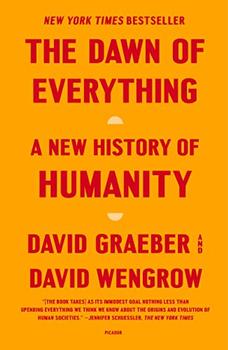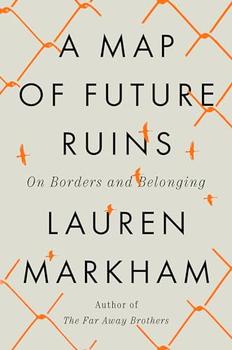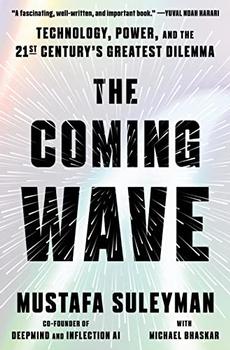Summary | Excerpt | Reviews | Beyond the book | Read-Alikes | Genres & Themes | Author Bio

Critics' Opinion:
Readers' Opinion:
First Published:
Nov 2021, 704 pages
Paperback:
Apr 2023, 704 pages
 Book Reviewed by:
Book Reviewed by:
Grace Graham-Taylor
Buy This Book
In The Dawn of Everything, American anthropologist David Graeber (who passed away in 2020) and British archeologist David Wengrow cross-pollinate to produce a compelling critique of how the story of humanity is traditionally told.
By studying the remnants of prehistoric humans, Graeber and Wengrow unpack many of the commonly held notions about early civilization. Though the book falls within the tradition of grand historical narratives, what sets it apart is that the authors are unbound by the desire to create a single, unifying thesis about human nature. They freely explore a wide range of early societies, pulling out fascinating and sometimes unexpected examples of how people lived. In doing so, they challenge the idea that human history can be neatly laid out as a series of natural evolutionary stages. In fact, The Dawn of Everything seeks to dispel clean linear narratives of humankind altogether — while at the same time resisting replacing these stories with a new one. This is a delicate task, one that requires the writers to consistently remind us that there is no blanket statement that can be made about human society at any one time. Rather than explaining (and by extension, justifying) why we are where we are now, Graeber and Wengrow's mission seems to be to show that the present we are living in is just one of many that were possible.
The impetus for doing so seems to be the authors' general dissatisfaction with the way that previous human societies have been oversimplified by past and present scholars. According to Graeber and Wengrow, broad historical narratives tend to fall into two familiar camps. There are those that, following Rousseau, describe early humans as living in a kind of "Garden of Eden." In this rendering, people lived in free and egalitarian tribal bands, which gradually hardened into hierarchies with the advent of farming and private property. Then there are the Hobbesians, who believe that early humanity was characterized by chaos and violence, which gradually abated as civilizations emerged. Both stories treat human history as though it were inevitable; neither offer people from these periods any real agency. Yet as Graeber and Wengrow show, history is replete with examples of societies that do not conform to these basic structures. From our earliest origins, it seems, human civilizations have evolved in highly particularized and sometimes counterintuitive ways. Here you will find examples of prehistoric hunter-gatherer societies that lived in grand, architecturally complex temples, and nomad societies such as the Nambikwara, who had kings in winter, but not in summer. Graeber and Wengrow spend time delving into the rich political philosophies of early Native American peoples, expounding on a lacerating critique of colonial settlers by demonstrating how these philosophies influenced European ideas of freedom and equality. The historical evidence presented in this book challenges some of the most basic assumptions about the meaning of civilization. It opens the door to a far richer and more complex understanding of human creativity and political thought.
One of the authors' great strengths is their commitment to treating our ancient antecedents as intellectual equals. Rather than seeing social organization as evolving out of necessity, they instead treat their various case studies as intelligent and self-reflective, living in the way that they did because they thought it best. In other words, early humans had options. Some chose to adopt agricultural practices and private property at a certain time; others, though they may have considered the possibility of doing so, decided against it. Likewise, the authors show that the presence of a more stringent hierarchy in some societies did not necessarily entail a greater degree of sophistication. The remarkable diversity of early human experiences suggests that an organized society needn't always come at the expense of individual freedom. This simple realization may allow readers to re-evaluate the choices that have led us to this moment — and wonder about our path into the future.
Despite the many wonderful and fascinating anecdotes in this book, there is sometimes an air of melancholy and frustration that permeates the writing. Humanity, the authors write, has "effectively got stuck"; relations that were once flexible and negotiable, like those between authority and subject, or the borders between home and away, have now become fixed. By conducting this inquiry, Graeber and Wengrow seem to be trying to make room to reimagine what current civilizations could look like. By deconstructing the myths that have confined us to a simple understanding of human nature as either good or evil, they pave the way for us to examine ourselves in a new light. This vast, incisive survey of human history holds important implications for the way that we think about the trajectory of civilization and could represent a major shift in the focus of anthropology. Written in a style that is accessible without being pandering, The Dawn of Everything can be enjoyed by serious academics and casual readers alike.
![]() This review was originally published in The BookBrowse Review in February 2022, and has been updated for the
April 2023 edition.
Click here to go to this issue.
This review was originally published in The BookBrowse Review in February 2022, and has been updated for the
April 2023 edition.
Click here to go to this issue.

If you liked The Dawn of Everything, try these:

by Lauren Markham
Published 2024
A mesmerizing, trailblazing synthesis of reporting, history, memoir, and essay.

by Mustafa Suleyman
Published 2023
An urgent warning of the unprecedented risks that AI and other fast-developing technologies pose to global order, and how we might contain them while we have the chance—from a co-founder of the pioneering artificial intelligence company DeepMind





The Flower Sisters
by Michelle Collins Anderson
From the new Fannie Flagg of the Ozarks, a richly-woven story of family, forgiveness, and reinvention.

The House on Biscayne Bay
by Chanel Cleeton
As death stalks a gothic mansion in Miami, the lives of two women intertwine as the past and present collide.

The Funeral Cryer by Wenyan Lu
Debut novelist Wenyan Lu brings us this witty yet profound story about one woman's midlife reawakening in contemporary rural China.
Your guide toexceptional books
BookBrowse seeks out and recommends the best in contemporary fiction and nonfiction—books that not only engage and entertain but also deepen our understanding of ourselves and the world around us.